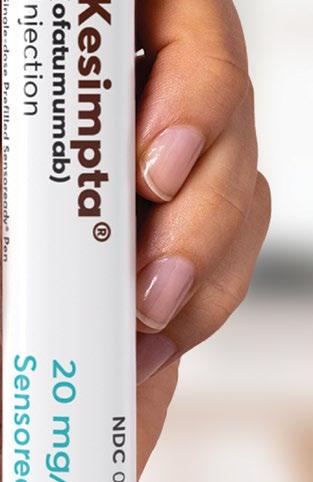
1 minute read
KESIMPTA® IS DIFFERENT FOR A REASON
The Only SC delivered B-cell RMS treatment1,2
Powerful efficacy.* Early and continued relapse reduction over the study period3,4



EFFICACY
Established safety profile in pivotal trials which included treatmentnaïve patients3,5
1 Minute a Month, † when the patient is ready to administer3,6
• Primary end point: relative reduction in adjusted ARR vs Aubagio® (teriflunomide) of 51% (0.11 vs 0.22) in ASCLEPIOS I and 58% (0.10 vs 0.25) in ASCLEPIOS II3
• Post hoc analysis of pooled data from ASCLEPIOS I and II: cumulative ARR by time interval (KESIMPTA N=946, Aubagio N=936). Reduction in ARR seen in the first 3 months and time intervals over 2 years 4,7:
– Month 0 to 3: 0.236 vs 0.373









– Month 0 to 27: 0.123 vs 0.258
– No conclusions can be drawn
SAFETY
• Adverse events with an incidence of ≥5% with KESIMPTA and a greater incidence than Aubagio were: upper respiratory tract infections (39% vs 38%), injection-related reactions (systemic) (21% vs 15%), headache (13% vs 12%), injection-site reactions (local) (11% vs 6%), urinary tract infection (10% vs 8%), back pain (8% vs 6%), and blood immunoglobulin M decrease (6% vs 2%)3
• The overall rate of infections and serious infections in patients treated with KESIMPTA was similar to patients who were treated with Aubagio (51.6% vs 52.7%, and 2.5% vs 1.8%, respectively)3


Indication
KESIMPTA is indicated for the treatment of relapsing forms of multiple sclerosis (MS), to include clinically isolated syndrome, relapsing-remitting disease, and active secondary progressive disease, in adults.

Important Safety Information
Contraindication: KESIMPTA is contraindicated in patients with active hepatitis B virus infection.
Warnings And Precautions
Infections: An increased risk of infections has been observed with other anti-CD20 B-cell depleting therapies. KESIMPTA has the potential for an increased risk of infections including serious bacterial, fungal, and new or reactivated viral infections; some have been fatal in patients treated with other anti-CD20 antibodies. The overall rate of infections and serious infections in KESIMPTAtreated patients was similar to teriflunomide-treated patients (51.6% vs 52.7%, and 2.5% vs 1.8%, respectively). The most common infections reported by KESIMPTA-treated patients in relapsing MS (RMS) trials included upper respiratory tract infection (39%) and urinary tract infection (10%). Delay KESIMPTA administration in patients with an active infection until resolved.
Consider the potential increased immunosuppressive effects when initiating KESIMPTA after an immunosuppressive therapy or initiating an immunosuppressive therapy after KESIMPTA.
Please see additional Important Safety Information and Brief Summary of full Prescribing Information on the following pages.
Make KESIMPTA® your 1st choice









